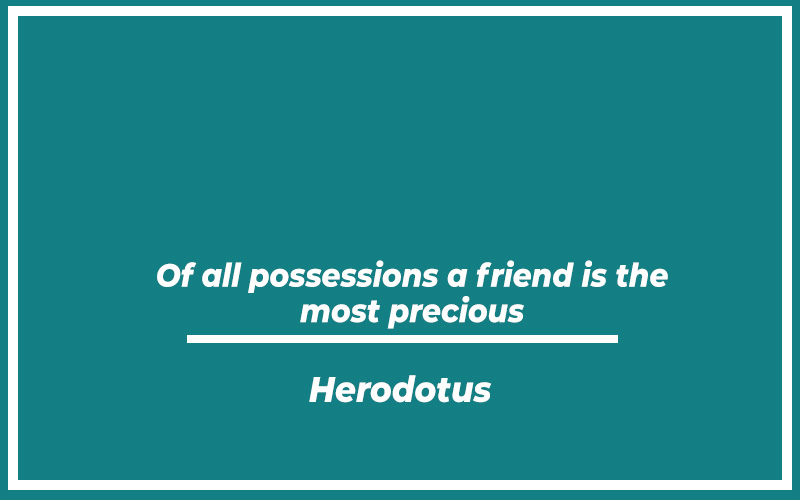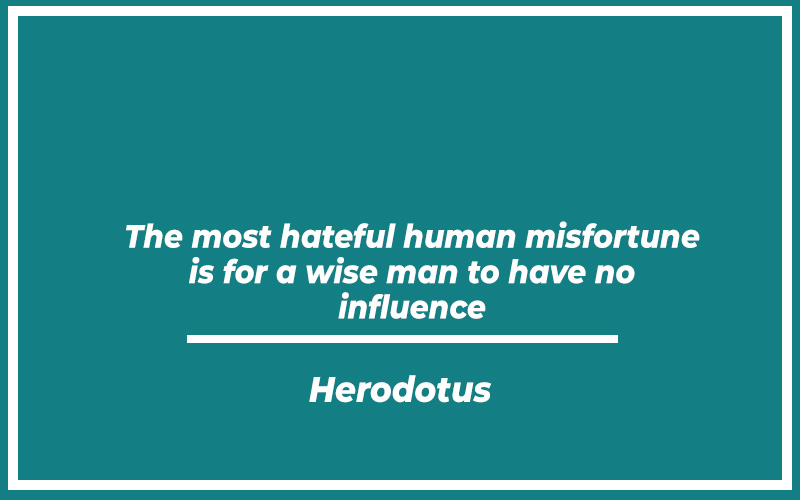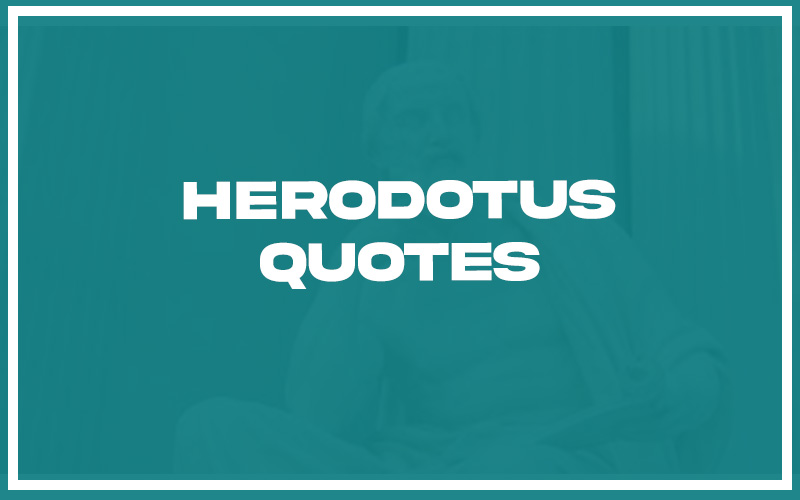If you’ve ever been fascinated by the intricate tales of ancient civilizations, then diving into the quotes of Herodotus will be like striking gold. Often called “The Father of History,”
Herodotus was the first to systematically collect his observations and weave them into a narrative, giving us a window into the past that is both broad and richly detailed. His quotes aren’t just informative; they’re reflective, offering insights into human nature, the complexities of culture, and the timeless patterns of societies.
As you explore his observations, you’ll likely find that many of Herodotus’ thoughts on the human condition remain relevant today, reminding you that in many ways, people haven’t changed all that much.
Best Herodotus Quotes

“Of all possessions a friend is the most precious.” – Herodotus
Herodotus emphasizes the irreplaceable value of friendship, ranking it above all material wealth. This quote reflects the ancient understanding that true companionship enriches life more than any tangible asset.
It reminds us that friendships provide not only comfort and joy but also essential support through life’s challenges, reinforcing the timeless wisdom that relationships are the core of human happiness and success.
Also Read: You Are Not Alone Quotes (with Explanation)
“Great deeds are usually wrought at great risks.” – Herodotus
This observation by Herodotus underscores the inherent risks associated with significant achievements. It suggests that the path to greatness often requires courage and the willingness to face potential failures.
This quote serves as a motivational reminder that fear of risk should not deter ambition and that the greatest rewards often come to those who dare to venture beyond their comfort zones.
“Force has no place where there is need of skill.” – Herodotus
Herodotus makes a compelling argument for the superiority of intellect over brute strength. This quote advocates for using wisdom and expertise to solve problems rather than relying on coercion or physical power.
It is particularly relevant in discussions about effective leadership and conflict resolution, promoting a strategy that values cleverness and skill above aggression.
“Adversity has the effect of drawing out strength and qualities of a man that would have laid dormant in its absence.” – Herodotus
Herodotus suggests that adversity plays a crucial role in developing personal strengths that might otherwise remain undiscovered.
This perspective highlights the value of challenges in personal growth, encouraging individuals to embrace difficulties as opportunities to uncover and cultivate latent qualities. It is a call to perceive obstacles as catalysts for developing resilience and character.
“If a man insisted always on being serious, and never allowed himself a bit of fun and relaxation, he would go mad or become unstable without knowing it.” – Herodotus
Through this quote, Herodotus stresses the importance of balance between seriousness and leisure in life. He warns that without regular breaks for fun and relaxation, a person might lose their mental stability.
This ancient wisdom remains relevant, reminding us of the need for occasional light-heartedness to maintain overall well-being and perspective in life.
“The worst pain a man can have is to know much and be impotent to act.” – Herodotus
Herodotus reflects on the frustration of being knowledgeable yet unable to effect change. This quote explores the agony of understanding one’s situation perfectly but lacking the power to alter it, emphasizing the importance of actionable knowledge and the capacity to implement it.
It is a poignant reminder of the need for both awareness and agency in pursuing effective and meaningful actions.
“It is better to be envied than pitied.” – Herodotus
Herodotus expresses a preference for envy over pity, suggesting that it is more desirable to be in a position that others aspire to rather than one that evokes sympathy.
This quote provokes thought about the perceptions of success and misfortune, encouraging a mindset that values achievement and respect over compassion derived from others’ perceived superiority.
“Great things are won by great dangers.” – Herodotus
Herodotus’ quote reflects the inherent risks associated with achieving remarkable feats. It emphasizes that true greatness often requires facing significant dangers, suggesting that the potential rewards justify the gamble. This perspective encourages individuals to embrace risk as an integral part of success, advocating for the courage to confront formidable challenges head-on.
It serves as a motivational reminder that extraordinary achievements are not secured through cautiousness but through bold and decisive actions that may initially seem perilous but are essential for reaching lofty goals.
“Force has no place where there is need of skill.” – Herodotus
Herodotus highlights the importance of expertise over brute strength in situations that demand precision and finesse. This quote suggests that success in complex scenarios relies more on intellectual and technical abilities than on physical force. It champions the value of strategic thinking and specialized skills, which are often more effective in achieving desired outcomes than the mere application of power.
This wisdom is applicable in various fields, from diplomacy and politics to business and personal relationships, where skillful handling often leads to better results than forceful approaches.
“Adversity has the effect of drawing out strength and qualities of a man that would have laid dormant in its absence.” – Herodotus
Herodotus observes that hardship serves as a catalyst for uncovering and developing personal strengths that might remain untapped in more comfortable circumstances. This quote underscores the transformative power of adversity, which, although challenging, forces individuals to grow and evolve in ways they might not have in easier times.
It encourages a positive view of difficult experiences as opportunities for personal development, reminding us that many of life’s valuable lessons and innate capabilities are often discovered and honed through trials and tribulations.
“If a man insisted always on being serious, and never allowed himself a bit of fun and relaxation, he would go mad or become unstable without knowing it.” – Herodotus
Herodotus warns against the dangers of a life devoid of leisure and enjoyment. By emphasizing the necessity of balance between seriousness and relaxation, he suggests that without regular intervals of joy and light-heartedness, mental and emotional health may deteriorate. This quote promotes the importance of integrating fun and downtime into our lives as essential components of overall well-being.
It serves as a reminder to not let the demands of work and responsibilities consume every aspect of life, highlighting the therapeutic and stabilizing effects of occasional levity and rest.
“The worst pain a man can have is to know much and be impotent to act.” – Herodotus
Herodotus articulates the deep frustration and agony of being knowledgeable yet unable to use that knowledge effectively. This quote resonates particularly with those who find themselves in positions where external constraints prevent them from applying their insights or skills.
It sheds light on the psychological distress that can arise from feeling powerless, emphasizing the importance of seeking environments where one’s knowledge and abilities can be fully utilized and valued.
“It is better to be envied than pitied.” – Herodotus
Herodotus compares the emotions of envy and pity, suggesting that envy, as a response to one’s achievements or status, is more desirable than pity, which is often linked to misfortune or failure. This quote reflects the human preference for being seen as successful rather than as a subject of sympathy.
It challenges us to strive for excellence and achievement that inspire admiration rather than compassion, promoting a proactive approach to life that aims to elevate one’s circumstances and reputation.
“The destiny of man is in his own soul.” – Herodotus
Herodotus asserts that an individual’s fate is largely determined by their inner character and choices rather than external forces. This quote promotes the idea of self-determination, suggesting that personal development and moral integrity are central to shaping one’s destiny.
It encourages self-reflection and conscientious decision-making as means to influence one’s future, advocating for personal responsibility in the pursuit of one’s goals and aspirations. This view empowers individuals to actively cultivate the qualities within themselves that will guide them toward their desired outcomes.
“Great things are won by great dangers.” – Herodotus
Herodotus points out that substantial achievements often demand substantial risks. This insight is meant to instill a readiness to face significant challenges, illustrating that fearlessness in the face of danger is a crucial component of success.
It emphasizes that the path to outstanding accomplishments is rarely safe or straightforward, encouraging individuals to embrace the possibility of failure as a stepping stone to greatness. This perspective fosters resilience, urging one to engage boldly with life’s uncertainties as a necessary precondition for achieving anything of lasting value.
“Circumstances rule men; men do not rule circumstances.” – Herodotus
Herodotus suggests a somewhat fatalistic view of human agency, proposing that individuals are often more controlled by their circumstances than they are controllers of them.
This perspective encourages an understanding of one’s limitations within the broader context of external forces. It invites reflection on how much of one’s life is shaped by factors outside one’s control and how one might respond adaptively to these conditions. The quote serves as a reminder to focus on adapting to and navigating within given circumstances rather than striving futilely to dominate them.
“Men trust their ears less than their eyes.” – Herodotus
Herodotus highlights a basic human instinct to prioritize visual over auditory information. This observation underlines the idea that seeing something firsthand tends to be more convincing than merely hearing about it. It reflects on the inherent skepticism in human nature and the importance of tangible evidence in forming beliefs and judgments.
This preference for visual confirmation has implications in various areas, including law, education, and interpersonal relationships, emphasizing the need for demonstrable proof over verbal assertions alone.
“Death is a delightful hiding place for weary men.” – Herodotus
In this contemplative quote, Herodotus reflects on death as a final respite from the trials of life. It portrays death not as a tragedy but as a sanctuary for those exhausted by life’s burdens.
This perspective provides a sobering yet comforting view on mortality, suggesting that death can offer peace and cessation from suffering. It invites us to consider the relationship between life’s struggles and the human longing for rest, providing a poignant reminder of the inevitable end that awaits all living beings.
“It is better to be envied than pitied.” – Herodotus
Herodotus expresses a preference for being the object of envy rather than pity, associating envy with success and pity with failure. This quote emphasizes the desire to achieve and maintain a status that others aspire to, rather than one that evokes sympathy.
It challenges individuals to strive for personal excellence and to seek accomplishments that garner respect rather than compassion, promoting a proactive rather than reactive approach to life’s challenges.
“The most hateful human misfortune is for a wise man to have no influence.” – Herodotus
Herodotus laments the plight of wise individuals who lack the power to effect change, highlighting the frustration that arises when knowledge and insight are ignored or undervalued. This quote underscores the importance of ensuring that wisdom is accompanied by the authority to implement it, advocating for societal structures that respect and empower intellectual contributions.
It is a call to recognize and harness the potential of knowledgeable individuals in shaping policies and decisions that affect the broader community.
“Very few things happen at the right time, and the rest do not happen at all.” – Herodotus
With this remark, Herodotus comments on the unpredictability and imperfection of timing in human affairs. It suggests a view of history and life where chance plays a significant role, and many plans or desires never come to fruition.
This acknowledgment of life’s inherent uncertainty encourages a realistic approach to planning and expectations, promoting patience and flexibility in the face of unforeseen outcomes and the often arbitrary nature of events.
“Great things are won by great dangers.” – Herodotus
Herodotus articulates the significant relationship between risk and reward, stating that monumental achievements often require considerable risks. This observation serves as a call to action for those striving for excellence, emphasizing the necessity of courage and daring.
It reminds us that to achieve anything truly outstanding, one must be willing to face and navigate substantial challenges.
“Circumstances rule men; men do not rule circumstances.” – Herodotus
This quote from Herodotus underscores the influence of external factors on human actions and decisions. It challenges the notion of complete free will by suggesting that our choices and behaviors are often constrained or dictated by the circumstances we find ourselves in.
This perspective encourages a deeper understanding of the contextual forces at play in our lives and promotes a more nuanced view of personal and historical events.
“Men trust their ears less than their eyes.” – Herodotus
Herodotus comments on the human tendency to rely more heavily on visual rather than auditory information. This observation highlights the skepticism with which spoken words are often treated and the preference for visual confirmation.
It reflects a broader understanding of human psychology and the ways in which our sensory perceptions shape our beliefs and actions.
“Death is a delightful hiding place for weary men.” – Herodotus
Herodotus offers a somber yet poetic reflection on death, suggesting it provides solace and escape from the trials of life. This quote contemplates the relief that death can bring to those burdened by life’s hardships, viewing it not just as an end but as a refuge.
It invites us to consider the role of mortality in the human experience and its impact on our understanding of life and suffering.
“It is better to be envied than pitied.” – Herodotus
Herodotus expresses a preference for envy over pity, associating the former with success and the latter with misfortune. This statement encourages striving for accomplishments that garner admiration rather than sympathy, highlighting the desire for a life that inspires others rather than one that evokes sorrow.
It challenges us to pursue achievements that lead to respect and recognition.

“The most hateful human misfortune is for a wise man to have no influence.” – Herodotus
This quote underscores the frustration of possessing wisdom that cannot be applied or acknowledged. Herodotus points out the tragedy of a knowledgeable individual lacking the power to effect change, highlighting the importance of influence alongside wisdom.
It serves as a reminder of the value of not only seeking knowledge but also ensuring it can be utilized effectively in one’s community or society.
“Very few things happen at the right time, and the rest do not happen at all.” – Herodotus
Herodotus reflects on the unpredictability and imperfection of timing in human affairs. This quote suggests that opportunities and successes are often subject to timing, much of which we cannot control.
It advocates for patience and adaptability, acknowledging that despite our efforts, many outcomes are determined by timing beyond our immediate influence.
Also Read: Darth Maul Quotes (with Explanation)
Final Thoughts
Herodotus’ quotes offer more than just historical data; they provide a philosophical lens through which to view the past and the present. As you reflect on his words, let them inspire you to think more deeply about how history shapes our understanding of the world.
Remember, Herodotus not only recorded events but also pondered the why and the how behind them, encouraging us to consider the larger forces at play in human affairs. Let his curiosity and meticulous attention to detail motivate you to explore the stories behind the surface of today’s world, much like he did with the ancient one.

